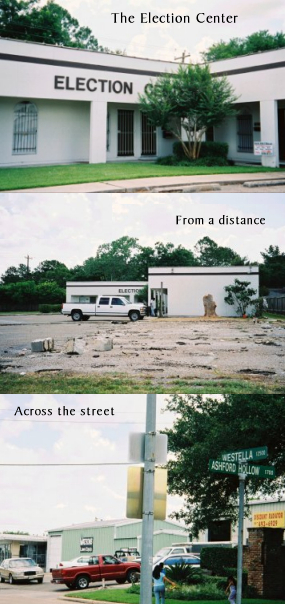Citizen-gathered evidence shows an increasing likelihood of electoral fraud
Posted in '06 Election, Bev Harris, Black Box (Electronic) Voting, General, TAKE ACTION! on October 10th, 2006It’s going to be up to us to make the case. We can’t solve a problem if we refuse to look. Citizens are fed up with black box elections, and are mustering up evidence of improper behavior that will swing the pendulum back in the direction it belongs.
Examples of the astonishing evidence uncovered by candidates and extraordinary citizens follows.
At first, we proved that the machines “theoretically’ could be tampered with. Then, in experiments in Leon County and Emery County, citizen-led investigations machines could ACTUALLY be tampered with.
At first, public records requests from Black Box Voting and others proved that election results were not authenticatable using available audit records. And now, Black Box Voting and citizens are coming up with audit records that show strong indications of improper behavior.
Be aware that we are not going to see a Perry Mason moment. Proof of corruption will be incremental, but it will come.
In 2006, your job will be to embark on the biggest citizen evidence-gathering expedition in history, to take this past the tipping point and achieve real change. Nothing will do but a reversal of the pendulum, back to citizen ownership and oversight of our own government and its electoral processes.
Let’s take a look now at some of the evidence citizens — and Black Box Voting — are uncovering:
1. Memphis: Candidates in Memphis asked Black Box Voting for help securing public records from the Aug. 3, 2006 election. Black Box Voting recommended getting a copy of the Diebold GEMS database, along with the Windows event log. What we found shocked us: The sheer number of legal and security violations in the event log were horrifying, and it also showed that Shelby County — or someone — was accessing the file during the middle of a Temporary Restraining Order prohibiting this.
– A remote access program called PC Anywhere was found resident in the system
– Evidence of insertion of an encrypted Lexar Jump Drive was present
– Evidence of attempts to alter or write HTML files (used to report results) was present
– Apparently without a firewall, the GEMS system was opened up to the County Network
– A prohibited program, Microsoft Access, which makes editing the election chimpanzee-easy, was installed on the system AND USED shortly after the election.
To read more about Memphis, click here: http://www.bbvforums.org/forums/messages/1954/44242.html
2. Alaska: In early 2006, the Alaska Democratic Party asked Black Box Voting for help. The election numbers simply didn’t add up. BBV’s Jim March urged them to fight for the right to obtain the Diebold GEMS database, which Diebold had until then been asserting proprietary rights over. After months of hard-fought battling, they prevailed. That database was released publicly at Black Box Voting here: http://www.bbvforums.org/forums/messages/2197/44183.html
You can open it yourself in Microsoft Access, and when you do, choose the table called “audit.” In this table you will see evidence that someone was changing things as recently as July 2006 — after the matter was in court, before the file was released. The changes are substantial, and involve redefining ballot and candidate items, along with a reference to a second memory card.
If you don’t have MS Access, here is a pdf copy of that controversial log: http://www.bbvforums.org/forums/messages/2197/44278.html
3. In Georgia, Cynthia McKinney contacted Black Box Voting. Very odd things were happening in the 2006 primary and the runoff election that followed — Democrats were being served up Republican primary ballots on the Diebold touch-screens, McKinney’s name was left off some ballots, but reportedly appeared on other ballots nowhere near her district. The electronic poll books — something Georgia voters never asked for and a whole new source of glitches — were malfunctioning regularly.
Black Box Voting advised McKinney to seek the troubleshooter and pollworker logs. What we found on these shocked us — in an election reported as “smooth” by the press, was evidence of dozens and dozens of voting machine malfunctions, electronic pollbook glitches, and most disturbing of all (given the dire consequences available based on the Hursti and Princeton studies), the seals for dozens of voting machines were missing, broken, and mismatched — yet the machines were used anyway.
To view a list of the problems in Dekalb County, Georgia, click here: http://www.bbvforums.org/forums/messages/1954/44150.html
4. In Ohio, Richard Hayes Phillips examined ballots from the 2004 presidential election. They’d been kept locked up for 22 months, and he was under immense pressure to look at as many as he could before they were destroyed. What he found shocked him: Patterns of tampering, as evidenced by statistically impossible overvotes, strategically placed and favoring George W. Bush. He listed his findings here: http://www.bbvforums.org/forums/messages/2197/44285.html
This is the tip of the iceberg. The missing ingredient is, and has been, the active oversight of the citizenry. In 2006, please join the movement as an active participant in overseeing and authenticating your election. We’ll help. Start here:
Citizen Tool Kit: http://www.blackboxvoting.org/toolkit.pdf
Bev Harris
Founder
Black Box Voting
From BlackBoxVoting.org






 polling stations running out of ballots and turning people away; voters sent back and forth between polling places; long lines not designated by precinct causing people to wait for hours in the wrong line.
polling stations running out of ballots and turning people away; voters sent back and forth between polling places; long lines not designated by precinct causing people to wait for hours in the wrong line.
